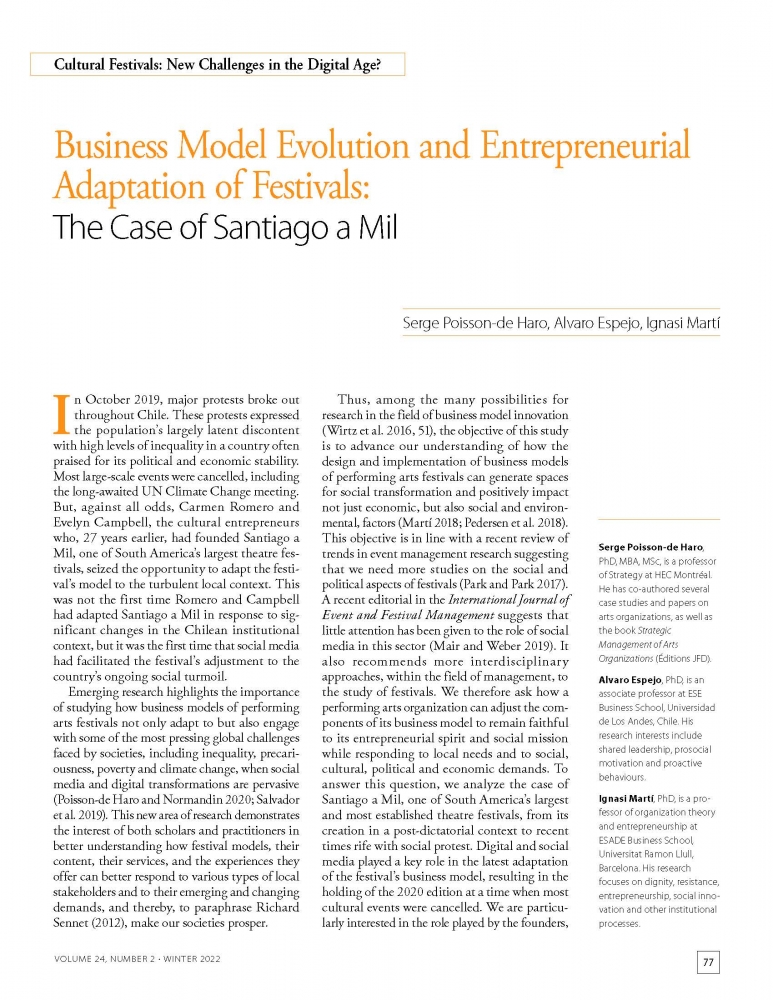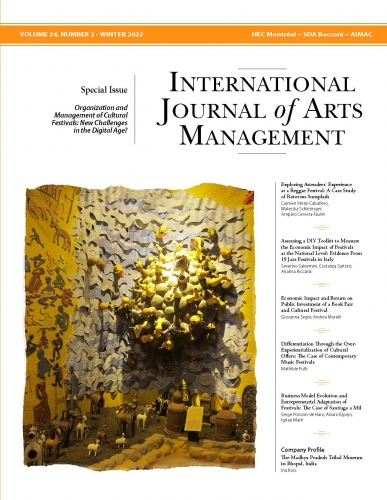Business Model Evolution and Entrepreneurial Adaptation of Festivals: The Case of Santiago a Mil
Produit: Article
21,00 $ CA
Serge Poisson-de Haro, Alvaro Espejo, Ignasi Martí
Serge Poisson-de Haro, PhD, MBA, MSc, is a professor of Strategy at HEC Montréal. He has co-authored several case studies and papers on arts organizations, as well as the book Strategic Management of Arts Organizations (Éditions JFD).
Alvaro Espejo, PhD, is an associate professor at ESE Business School, Universidad de Los Andes, Chile. His research interests include shared leadership, prosocial motivation and proactive behaviours.
Ignasi Martí, PhD, is a professor of organization theory and entrepreneurship at ESADE Business School, Universitat Ramon Llull, Barcelona. His research focuses on dignity, resistance, entrepreneurship, social innovation and other institutional processes.
ABSTRACT
Santiago a Mil was founded in Santiago, Chile, in 1994 and is now one of South America’s most successful theatre festivals. This case study looks at the evolution of the business model for the festival, a private initiative launched by two cultural entrepreneurs with strong social values. The authors identify four periods in the evolution of the business model in the context of Santiago a Mil and describe how the festival has recently adapted to a difficult local situation, strengthening its connection with audiences and the public, both live and through social media. They underline some factors in the external context and in the entrepreneurial profile of the two founders that may have influenced how the festival’s business model evolved over time. The authors also discuss the role of festivals and cultural entrepreneurs as social actors that impact the world today, when protests increasingly are being orchestrated on social media.
KEYWORDS
Theatre festival, business model adaptation, cultural entrepreneurs, Chile
RÉSUMÉ
Le Santiago a Mil a été fondé à Santiago, au Chili, en 1994 et est aujourd’hui l’un des festivals de théâtre les plus reconnus en Amérique du Sud. Cette étude de cas examine l’évolution du modèle d’affaires du festival, une initiative privée lancée par deux entrepreneurs culturels ayant de fortes valeurs sociales. Les auteurs décrivent quatre périodes de l’évolution du modèle d’affaires du Santiago a Mil et expliquent comment le festival s’est adapté récemment à une situation locale tendue, renforçant ses liens avec les festivaliers et le grand public, au cours du festival, mais aussi sur les médias sociaux. Ils relèvent certains facteurs externes et des aspects du profil entrepreneurial des deux fondateurs qui peuvent avoir influencé la manière dont le modèle d’affaires du festival a évolué au fil du temps. Les auteurs s’attardent également au rôle des festivals et des entrepreneurs culturels en tant qu’acteurs sociaux ayant un impact sur le monde d’aujourd’hui, alors que les mouvements de protestation sont de plus en plus organisés sur les médias sociaux.
MOTS CLÉS
Festival de théâtre, adaptation du modèle d’affaires, entrepreneurs culturels, Chili
RESUMEN
Santiago a Mil se fundó en Santiago de Chile en 1994 y ahora representa uno de los festivales de teatro más exitosos de Sudamérica. En este estudio de caso examina la evolución del modelo empresarial del festival, una iniciativa privada lanzada por dos emprendedores culturales con fuertes valores sociales. Los autores identifican cuatro períodos en la evolución del modelo empresarial en el contexto de Santiago a Mil, y describen cómo el festival se ha adaptado recientemente a una situación local difícil, fortaleciendo su vínculo con sus espectadores y el público, tanto en directo como en las redes sociales. Hacen destacar algunos factores externos, así como aspectos del perfil empresarial de los dos fundadores que pueden haber influenciado la evolución del modelo empresarial con el tiempo. Los autores también abordan el papel de los festivales y de los emprendedores culturales como actores sociales que inciden en el mundo actual, cuando las protestas se articulan cada vez más en las redes sociales.
PALABRAS CLAVE
Festival de teatro, adaptación de modelo empresarial, emprendedores culturales, Chile

